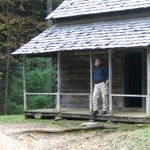The Parable Of The Garden
Once upon a time there was a kindly old man who had a wonderful and productive garden. He had labored endlessly for months to make the soil rich and level, well drained and open to the air and sun. He planted seeds that would grow to fruition, and he arranged them into communities that benefited one another. Root vegetables on one end, bean and legumes in the center, and flowering vegetables on the other end. It was an act of love and mutual benefit as he would attend to and nurture his crop, and the crop would prosper and thus reward him with its bounty.
To rid the garden of all the invading weeds became an ever more arduous task for the old man. They could reproduce and invade faster than he could pull them out. And any roots that were not removed would sprout even more weeds, made stronger by their survival. Soon the garden was all but gone, now nothing but a tract of uncontrolled and spreading weed growth. The old man lost his bounty as all his plants died, but insisted that the weeds were not to blame. It was only their nature, after all, he would tell himself. But in that attempt at self consolation, he had denied and nullified his own nature. And that nature was to protect, defend and harvest the bounty of his own labors, and for his benefit solely.
And in that misinterpretation of the world as it truly is, the old man lost his garden to the weeds. And soon, with no source of food, the old man, like his garden before him, wasted away and died.

No comments:
Post a Comment